-
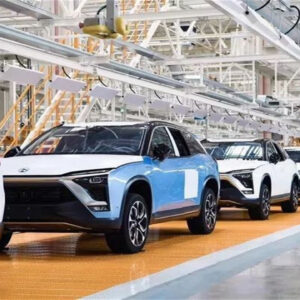
The EV assembly line is tailored for electric vehicle production, integrating automation and lean manufacturing. It includes stamping for body parts, robotic welding, painting processes, and final assembly with interiors and powertrains. Key components like batteries and motors are installed in dedicated areas. Quality checks are conducted throughout, and vehicles are tested on a track. Information systems like MES manage production, ensuring energy efficiency and sustainability.
-
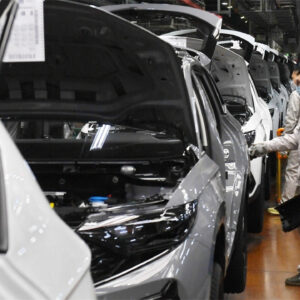
EV production lines boost efficiency by reducing labor needs, increasing speed and precision, minimizing errors, and optimizing processes. They enhance flexibility, lower injury risks, enable predictive maintenance, collect data for analysis, and support continuous operation. This leads to cost savings and improved competitiveness.
-
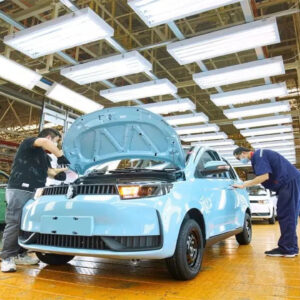
The EV automated assembly line is designed for efficient electric vehicle production. It features automated stamping, robotic welding, and painting processes. Core components like batteries and motors are installed by automated systems. Modular assembly and quality control checks ensure precision. Information management systems optimize production, and energy efficiency measures reduce environmental impact, meeting the demand for sustainable, high-quality electric vehicles.
-
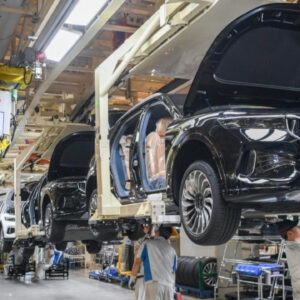
EV CKD assembly lines are customized for electric vehicles, emphasizing quality control, especially for electric drive and high-voltage systems. They integrate digital technology and intelligent manufacturing for efficiency and feature modular, automated designs for flexibility. These lines also prioritize environmental sustainability and energy efficiency, adapting to various EV models and market demands.
-
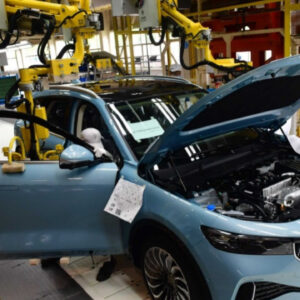
EV intelligent assembly lines offer high automation, flexible design, efficient production, and strong adaptability. These lines are also cost-effective, reducing production costs through improved efficiency and lower labor needs. They support customization to meet diverse market demands and contribute to environmental sustainability by minimizing waste.
-
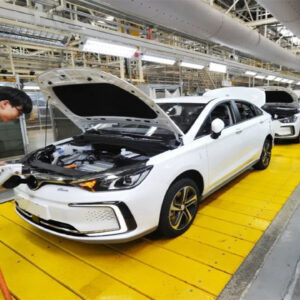
EV SKD assembly lines focus on importing major pre-assembled components like powertrains and chassis, tailored for electric vehicles. They prioritize quality control, especially for electric systems, and integrate digital and smart manufacturing technologies to enhance efficiency and product quality. These lines offer a flexible approach to EV production, meeting specific manufacturing needs and environmental standards.
-
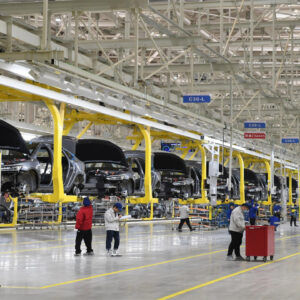
EV SKD/CKD assembly lines adapt to the specific needs of electric vehicle production, combining traditional car manufacturing with new energy tech requirements. In SKD, major components like powertrains are partially assembled abroad and finished locally. CKD involves importing completely disassembled parts for local assembly, boosting local industry. These lines emphasize electrical system checks, technological applications, and digital marketing for customized production. Automation advancements ensure efficient, high-quality EV manufacturing, meeting environmental and energy-saving trends.
-
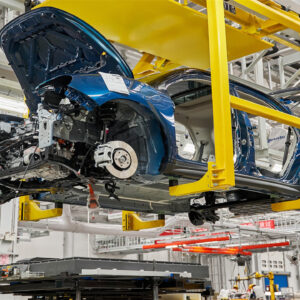
EV smart assembly lines automate the production of electric vehicles with advanced technologies. They feature automated stamping, robotic welding, and painting, along with battery and motor assembly. Modular design allows for flexible production of various models. Information management systems like MES optimize workflows, while quality control ensures compliance with standards. These lines focus on energy efficiency and environmental sustainability, representing modern manufacturing’s advancements.
-

خطوط تجميع/إنتاج المركبات الكهربائية مناسبة لتجميع/إنتاج:- مركبات ذات 4 عجلات- سيارات سيدان- مركبات الدفع الرباعي- السيارات بمختلف أنواعها- المركبات الكهربائية- وغيرها (وفي بعض الأحيان، تكون مناسبة لإنتاج الشاحنات الصغيرة) تُشير خطوط تجميع المركبات الكهربائية بنظامي SKD/CKD إلى خطوط التجميع شبه المُجمَّعة والتجميع كامِل التفكيك للمركبات الكهربائية. تم تصميم هذه الخطوط لتلبية متطلبات الإنتاج الخاصة…
-

خطوط تجميع/إنتاج المركبات الكهربائية مناسبة لتجميع/إنتاج:- مركبات ذات 4 عجلات- سيارات سيدان- مركبات الدفع الرباعي- السيارات بمختلف أنواعها- المركبات الكهربائية- وغيرها (وفي بعض الأحيان، تكون مناسبة لإنتاج الشاحنات الصغيرة) تُعزز خطوط تجميع المركبات الكهربائية كفاءة الإنتاج من خلال الطرق التالية: تقليل متطلبات العمالة : تقلل الأتمتة الاعتماد على العمالة اليدوية، مما يخفض تكاليف العمالة….
-

خطوط تجميع/إنتاج المركبات الكهربائية مناسبة لتجميع/إنتاج:- مركبات ذات 4 عجلات- سيارات سيدان- مركبات الدفع الرباعي- السيارات بمختلف أنواعها- المركبات الكهربائية- وغيرها (وفي بعض الأحيان، تكون مناسبة لإنتاج الشاحنات الصغيرة) يتم تصميم خط تجميع المركبات الكهربائية الآلي خصيصًا لتجميع المركبات الكهربائية، حيث يستخدم عمليات آلية بالكامل لتعزيز كفاءة الإنتاج وجودة المركبات. فيما يلي أبرز الميزات الرئيسية…
-

خطوط تجميع/إنتاج المركبات الكهربائية مناسبة لتجميع/إنتاج:- مركبات ذات 4 عجلات- سيارات سيدان- مركبات الدفع الرباعي- السيارات بمختلف أنواعها- المركبات الكهربائية- وغيرها (وفي بعض الأحيان، تكون مناسبة لإنتاج الشاحنات الصغيرة) تقدم خطوط تجميع المركبات الكهربائية الذكية الميزات والفوائد التالية: الأتمتة العالية وتكنولوجيا المعلومات : توفر حلولاً شاملة للإنتاج عالي الأتمتة، والمعلوماتية، والذكاء، والمرونة. تصميم مرن للتخطيط…
-

خطوط تجميع/إنتاج المركبات الكهربائية مناسبة لتجميع/إنتاج:- مركبات ذات 4 عجلات- سيارات سيدان- مركبات الدفع الرباعي- السيارات بمختلف أنواعها- المركبات الكهربائية- وغيرها (وفي بعض الأحيان، تكون مناسبة لإنتاج الشاحنات الصغيرة) تم تصميم خطوط تجميع المركبات الكهربائية الذكية للإنتاج الآلي والذكي للمركبات الكهربائية. تدمج هذه الخطوط أحدث تقنيات التصنيع وتكنولوجيا المعلومات لتعزيز كفاءة الإنتاج، وخفض التكاليف، وضمان…
-

خطوط تجميع/إنتاج المركبات الكهربائية مناسبة لتجميع/إنتاج:- مركبات ذات 4 عجلات- سيارات سيدان- مركبات الدفع الرباعي- السيارات بمختلف أنواعها- المركبات الكهربائية- وغيرها (وفي بعض الأحيان، تكون مناسبة لإنتاج الشاحنات الصغيرة) تُصمم خطوط تجميع المركبات الكهربائية بنظام الشحن المُفَكَك بالكامل (CKD) خصيصًا لعملية تجميع المركبات الكهربائية، وتتميز بالخصائص والمزايا التالية: التكيف مع خصائص المركبات الكهربائية : على…
-

خطوط تجميع/إنتاج المركبات الكهربائية مناسبة لتجميع/إنتاج:- مركبات ذات 4 عجلات- سيارات سيدان- مركبات الدفع الرباعي- السيارات بمختلف أنواعها- المركبات الكهربائية- وغيرها (وفي بعض الأحيان، تكون مناسبة لإنتاج الشاحنات الصغيرة) تم تصميم خطوط تجميع المركبات الكهربائية بنظام (SKD) خصيصًا لتجميع المركبات الكهربائية وتتميز بعدة ميزات وفوائد: استيراد المجموعات الرئيسية : في نظام SKD، يتم بالفعل تصنيع…
-

خطوط تجميع/إنتاج المركبات الكهربائية مناسبة لتجميع/إنتاج:- مركبات ذات 4 عجلات- سيارات سيدان- مركبات الدفع الرباعي- السيارات بمختلف أنواعها- المركبات الكهربائية- وغيرها (وفي بعض الأحيان، تكون مناسبة لإنتاج الشاحنات الصغيرة) يُعد خط تجميع المركبات الكهربائية، المصمم خصيصًا لتجميع هذه الفئة من المركبات، مزيجًا متكاملًا من تقنيات الأتمتة ومبادئ الإنتاج الهزيل لتعزيز كفاءة الإنتاج وجودة المنتج. فيما…







